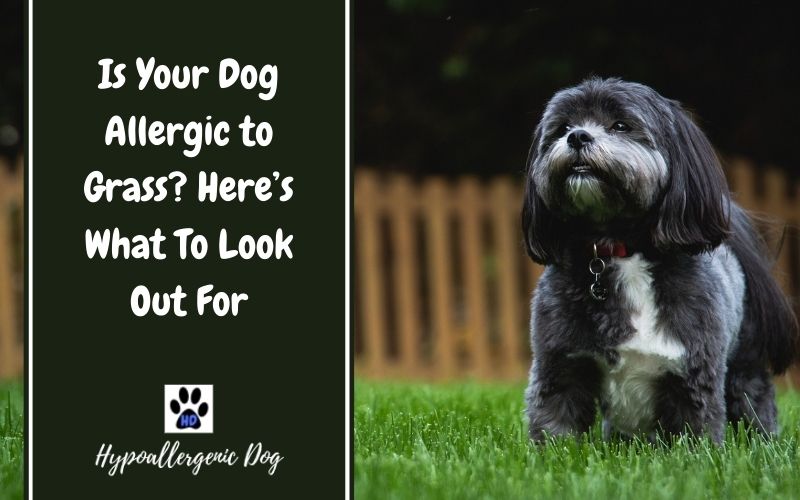Could you really have a dog allergic to grass?
The short answer is yes.
Surprisingly a grass allergy in dogs is more common than you may think. Studies indicate that more than 80 percent of dogs displayed signs of an allergy to grass, weeds, and tree pollen.
However, owners are often unaware that their dog is allergic to grass, or what to do if your dog is allergic to grass.
This is why I’m going to cover all the essential information concerning dog grass allergy symptoms — as well as tried and tested methods to help your beloved bow-wow feel better.
Checking for Other Conditions
If you’re convinced that my dog is allergic to grass and your pooch is showing all the signs, you should still explore all possibilities. This ensures you don’t end up with the wrong diagnosis and a treatment plan that may do more harm than good.
Attending regular health checkups with your veterinary practice is the best way to keep your furry friend healthy and happy. And, the quickest way to spot any issues before they get out of hand.
Fleas
These minute beasties can infest and develop rapidly on dogs and cats alike, meaning if you have either in your household, a problem can rapidly exacerbate. It takes minutes for them to start feeding on your pup’s skin so acting fast and keeping up with regular treatments is vital.
Signs of a flea infestation can be very similar to a dog allergic to grass symptoms. Itching, biting, hair loss, and scabs on their body can often be commonly mistaken as a sign of a dog allergy to grass.
Dermatitis
A condition that affects dogs and humans alike. Dermatitis causes itching and inflammation of the skin and left untreated, can seriously impact your dog’s quality of life. It could cause them to lose their appetite as well as them being unable to rest and relax.
Again the symptoms of dermatitis can look very similar to those of a grass allergy so speak to your vet to ensure a correct diagnosis.
Dry Skin
Itching in your dog can be caused by dry skin but there are a variety of different issues that could be causing the problem — from parasites, infections, poor nutrition, or even systemic disorders. Many of which could be mistaken for an allergy to grass.
For any of these conditions to be treated successfully and quickly, they would require you to see your vet and get a proper diagnosis. This may mean that your dog will require further tests to pinpoint the cause.
What Can You Give a Dog Who is Allergic to Grass?
So, now you’re thinking, my dog is allergic to grass — how can I help them?
Here are a few top dog grass allergy treatment tips for you to take away:
- Limit exposure — can be much easier than you think to achieve and there are ways around it so your pooch can live a long, happy, and healthy life without discomfort.
For example, avoid walking your dog during times of the day when the pollen is high — generally first thing in the morning and late evenings, although this does depend on the weather. Also, steer clear of walkies through very long grass.
- Conventional medicine — in more severe cases, aggressive treatment may be necessary to provide the relief they need. This could be in the form of antihistamines, medication, oral, or topical supplements.
- Regular grooming — is the best way to keep your pet’s coat clean, fresh and to eradicate lingering pollen and other allergy-triggering elements.
- Wash their paws — in the same way you wipe your feet before you enter the home, clean your pooch’s paws. This should reduce the chances of carrying grass pollen inside and traipsing it around your home.
- Monitor the pollen count — use weather apps. This will help provide you with an indication of when to limit your tail-wagger’s time outdoors, so they don’t suffer the consequences.
- Anti-itching shampoo blends will also provide great relief to your dog if they do seem to be showing excessive signs of discomfort.
- Omega 3 and 6 — these fatty acids offer dogs with allergies some amazing benefits, such as improving the general condition of their skin and reducing inflammation. After all, when your dog’s skin is healthy, it provides them with a natural barrier against allergens such as pollen, mold, and dust mites
Conclusion
Hopefully, in this article, you’ve been able to determine if your dog is allergic to grass or if it’s something else causing the problem.
Bear in mind, it’s essential to recognize the signs so that you can treat your pooch as quickly as possible — alleviating dog grass allergy complaints and keeping your tail-wagger as comfortable as possible during peak pollen periods.
Remember, having a dog allergic to grass isn’t the end of the world, and they can still live a happy and healthy life.
Grass Allergies in Dogs FAQs
“Can Dogs Grow Out of Grass Allergies?”
They don’t necessarily grow out of their allergy but they should show improvement within a few months of receiving the right treatment.
“What Is a Natural Antihistamine for Dogs?”
Quercetin is most often what is used to treat itchiness, inflammation, and the discomfort that’s caused by allergies. This natural antihistamine is commonly called nature’s Benadryl.
“What Do I Do if My Dog Is Allergic to Grass?”
If you have a backyard with a lawn, keep it mowed and avoid letting it grow too long. A few other things you can do to help are:
- Limit time outdoors when the pollen count is high.
- Ensure that their feet, belly, and legs are wiped after being outside.
- Offer omega 3 and 6 supplements.
“What Can I Give My Dog For Outdoor Allergies?”
Benadryl (diphenhydramine) is an antihistamine and can be used to treat a dog allergic to grass. But you must ensure the correct dosage to weight ratio.
“How Do Dogs Develop Allergies?”
Dogs can develop allergies at any stage in their life. However, with this type of environmental allergy, you may see your dog suffering more during certain times of the year — where dust and pollen are at a higher level. This is when you’re more likely to notice your dogs allergic to grass.
“How Can I Treat My Dogs Allergies?”
There are a few different ways to treat dog allergies — antihistamines, decongestants, or even an allergy shot. However, if you’re interested in alternative treatments, check out my allergy home remedies guide.
“What Are the Symptoms of Grass Allergies?”
The main symptoms of grass allergies in dogs are the following:
- Runny or watery eyes.
- Itching.
- Hives — small red lumps.
- Excessive licking.


